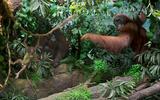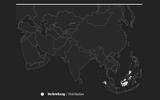
Bornean orangutan
Pongo pygmaeus
Sumatran orangutan or Tapanuli organgutan
Pongo abelii or Pongo tapanuliensis
Habitat
Tropical rainforests
Conservation status
Critically endangered. The main threat to this species is habitat destruction: native rainforests are cleared to make room for palm oil plantations, for example. But the animals are also threatened by poaching and illegal trade — their meat is prized, and young orangutans are popular as pets.
Biology
The animals mainly feed on fruits, leaves and bark. Though they do not live in groups, they are not strictly solitary either. Females first give birth at around 14 years of age. The only lasting relationship is between mother and offspring: the young are nursed up to the age of 7 and only become independent when they are 9 years old. No other species looks after its young for so long.

Diorama
1978
In the wild, a baby orangutan just 8 months old would still be clinging to its mother.
Provenance
1978, Männchen «Freeman», das erste im Zoo Basel geborene Orang‑Utan-Baby, mit acht Monaten an Fadenwurmbefall gestorben, Zoo Basel; 1886, Borneo-Orang‑Utan, Männchen, Ankauf von Conrad Kläsi, Niederurnen, GL; 1883, Sumatra-Orang‑Utan, Männchen, Ankauf von «Frank, London» (Genaue Identität unbekannt)